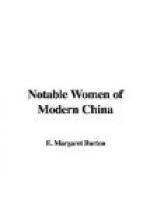After the Revolution was practically over, but conditions were still so unsettled as to make it unwise to reopen the hospital, Dr. Stone and several of her nurses made a trip to a number of towns in the region around Kiukiang. In a recent letter Dr. Stone tells of being given a piece of land by the influential people in one of these towns, with the earnest entreaty that she leave a nurse there to carry on a permanent medical work. She could make them no definite promise, but is hoping that friends in America will make it financially possible to support a nurse and dispensary where they are so greatly needed.
Truly the Chinese women are blessed in having so perfect an embodiment of the ideal woman of the great new China in this unassuming physician, whom a friend who has known her from babyhood declares to have the most perfect Christian character of any one she knows. After his visit in Kiukiang, Dr. Perkins exclaimed: “Such a wonderful woman as Dr. Mary Stone is! I do not know of any good quality she does not possess”; and one who has had an intimate acquaintance with the college women of America says: “What a marvel Dr. Stone is! To me she is unexcelled in charm, in singleness of purpose, and all-round efficiency, by any other woman I have ever known.”
* * * * *
YU KULIANG
* * * * *
[Illustration: Yu Kuliang]
YU KULIANG
The same year that little Mary Stone first saw the light, on almost the same day, in another part of the same city, another little girl was born, a member of the same proud old family whose line runs back so many years into Chinese antiquity. Unlike Mary Stone, she was not born into a Christian home, but it was a home where the parents truly loved each other, and one in which she might have spent a very happy childhood, had not the young father died while she was still a baby.
The mother, broken-hearted over her husband’s death, decided to become a Taoist nun and devote the remainder of her life to the search for truth. With her baby she shut herself up in a little hut outside of the city, seeing no one, and giving her whole time to the care of the child and her efforts to find truth. The members of her family, which is one of the wealthiest and most aristocratic in Kiukiang, were greatly pleased with what they considered an eminently virtuous resolve for a young widow to make, and applied to the Emperor for his approval of the course she had decided to follow. This being heartily given, they built a very comfortable home for her on the outskirts of Kiukiang. The building was christened Purity Hall, and over its gateway were placed large placards announcing the imperial sanction of the life which the young widow had chosen for herself and her child.




